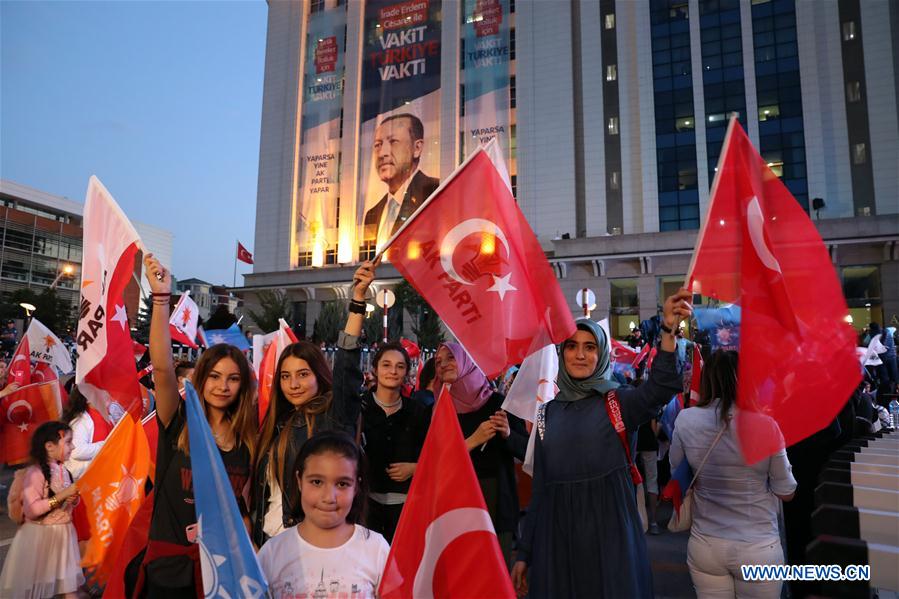Turkey's recent elections and the power of nationalism
- By Sumantra Maitra
 0 Comment(s)
0 Comment(s) Print
Print E-mail China.org.cn, July 4, 2018
E-mail China.org.cn, July 4, 2018

What does the latest Turkish election result tell us? Analysts in many Western countries have been quick to say one thing: The results were unsurprising and predictable. Turkey is an eye-opening example of the force of nationalism, and illustrates certain key trends that have been dominating world politics for some time now. Foreign media were naturally excited about Mr. Erdogan's opponent, Mr. Ince, an English speaking, liberal candidate, who led a lively campaign and attracted a strong urban liberal crowd. Unfortunately, that was not enough, as Mr. Ince won a mere 31 percent of the vote. A similar situation also happened in both Russia and Hungary. The polls, which focused on the urban crowds, marching and tweeting, failed to take into account the deep and conservative nationalist majority. Typically, like all polls since 2016, they failed to understand why Erdogan is so popular.
The reaction to Erdogan's win was similar to the reaction that greeted Putin's win or Orban's win–one of shock. The urban liberal class of Western countries, some of whom believe history ended in 1991, were as baffled as the pollsters who tried to make sense of the votes. Erdogan's win was interpreted as the global retreat of liberal democracy and the rise of authoritarianism.
This is of course, a flawed analysis–there is no global retreat of democracy. Democracy has been successful in Russia, where President Putin performed as expected, as per the majority of Levada polls, from Russia itself, and experienced the majority support in a country heavily embattled and besieged by what it perceives as foreign threats. Likewise, in Hungary, Viktor Orban won over 71 percent of the votes, primarily from voters who wanted less immigration. Likewise, in Turkey, most of the rural Turkish votes, especially from the poorer parts of the country in the east, went to Erdogan.
The fundamental problem is misperception. When Eastern European states wanted to leave the Warsaw pact, they didn't do it because they loved liberalism. They did it because the forces of nationalism in those countries were dormant and wanted to break free. Turkey, however, is a very different case. Once a major empire which controlled the entire Middle East, alongside Persia, Turkey lost its imperial role after the first world war. With the forced secularization by Ata Turk, Turkey transformed into a secular republic, similar to Egypt, Syria, and Libya. However, the forces of religion remained dormant in the country and never died out. Turkey aligned with NATO out of a deep fear of the Soviets, as Russia and the Ottomans had a centuries old rivalry in the region. Again, it had nothing to do with their love for liberalism, but out of strategic necessity and fear.
With secular forces withering away, the social vacuum was quickly filled with religious forces, and Turkey and Eastern Europe were no exceptions. Poland and Hungary, among other countries, have adopted Christianity and nationalism, just as Turkey has adopted moderate Islamism and nationalism. This combination of religion and soft nationalism can also be found in India, although one wouldn't find much Western criticism, as India is a Western ally. But the truth remains, Turkey's combination of religion and nationalism is there to stay and other countries are expected to follow suit.
Western analysis was wrong, primarily because they considered Eastern and Central Europe, including Turkey, to be part of the West simply because they are part of NATO. Historically, culturally, or geographically, neither Turkey, nor major parts of Europe, falls under the "West," which essentially only include Western and Northern European liberal democracies. History shapes culture, and Western European states were shaped by their history, which was completely different from Eastern Europe and the Middle East. In a bipolar world, blocs made sense. In a multipolar world, they were naturally meaningless. Perhaps a better way to understand, analyze, and even predict global affairs is to divide regions based on their history and culture, instead of arbitrarily marking every country which practices some form of democracy as part of the West. Perhaps then, people wouldn't be so baffled when those same countries refuse to follow liberal norms.
Sumantra Maitra is a columnist with China.org.cn. For more information please visit:
http://www.china.org.cn/opinion/SumantraMaitra.htm
Opinion articles reflect the views of their authors only, not necessarily those of China.org.cn.






Go to Forum >>0 Comment(s)